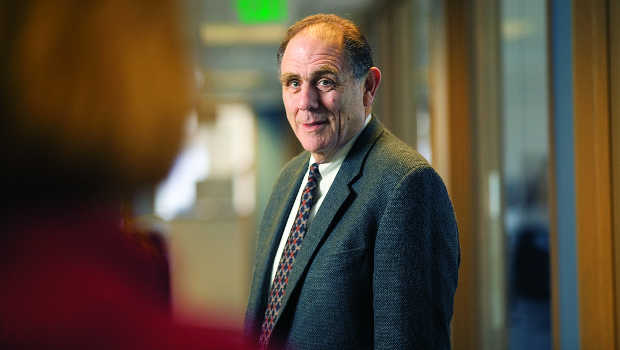Dr. Ed Wagner: A model of values-based leadership

KPWHRI celebrates its founding director’s unwavering focus on science for the public good, writes Dr. Eric B. Larson
Kaiser Permanente Washington Health Research Institute (KPWHRI) and our community mark a significant milestone next month: the retirement of Dr. Ed Wagner, our founding director and a remarkable leader in health services research.
Ed’s many achievements at improving health and health care are well documented through the hundreds of papers he’s published, and the dozens of honors he’s received. He’s been most acclaimed for developing and spreading the Chronic Care Model, a framework that’s now considered foundational for delivering high-quality, patient-centered primary care.
But Ed’s CV can’t capture what many of his colleagues appreciate most. Over the years, we have seen in Ed a great intellect and — just as important — a leader who truly enjoys helping others to succeed by focusing on the public good.
Built strong ties to UW
I first met Ed in 1983, shortly after Group Health Cooperative hired him to establish its new Center for Health Studies (now KPWHRI). One of Ed’s first efforts was to build strong ties with the University of Washington (UW) schools of medicine and public health. I was running the UW Geriatrics & Family Services Clinic at the time, studying patients with Alzheimer’s disease and other dementias. When Ed invited me to join a project aimed at helping seniors prevent falls, I was intrigued, and even more so as we began to develop community-based exercise programs for seniors.
Like many scientists at academic medical centers, I knew the limitations of research in specialized populations. By collaborating with an integrated health care system like Group Health, we could do things differently. We could learn from large populations of patients getting care in everyday clinical situations. The advantage? Our findings would translate more effectively into real-world health care.
As with many innovations Ed and his nimble team began testing at that time (phone-based smoking cessation, risk-based breast cancer screening, a childhood vaccine registry, to name a few) the senior fitness program proved successful. Likewise, this work eventually benefitted people far beyond the Group Health population. Some 60 insurance companies now offer “Silver Sneakers” for free to millions of seniors nationwide.
In the meantime, Ed allowed my research team to establish the Alzheimer’s Disease Patient Registry within Group Health, beginning a line of research that the National Institute on Aging has continually funded for more than 30 years. Other researchers from the UW, Fred Hutchinson Cancer Research Center, the Veterans Administration, and elsewhere established similar collaborations with Group Health, serving its members and the public.
Far-reaching impact
Ed was tremendously talented at recognizing and seizing opportunities to further the organization’s mission. Working shoulder-to-shoulder with Group Health care-delivery leaders in the 1990s, he helped develop evidence-based guidelines for various at-risk populations, diseases, and conditions. This led to quality improvements at Group Health and creation of the Chronic Care Model. In an initiative funded by the Robert Wood Johnson Foundation, Ed’s team led efforts to spread that model nationwide to primary care practices caring for a growing number of persons with chronic conditions. The model is now being used worldwide.
Ed also led efforts in the mid-1990s to establish the HMO Research Network (now called the Health Care Systems Research Network), a consortium of research institutes embedded in integrated health systems throughout the country, so they could share best practices and conduct joint studies.
Mission-driven culture persists
I knew about these achievements when I became director of the Center for Health Studies in 2002. (Ed had stepped down from the position a few years earlier to lead the Center’s MacColl Institute for Health Care Innovation.) What I didn’t know, but soon found, was the true value of what he had established. In addition to gathering a well-run group of great scientists interested in important topics, Ed had created a team committed to shared values inherent in research aimed at improving health and health care for all. My first impression, which remains true today, was that he had built the most mission-driven culture I had ever experienced.
That was 15 years ago. Since then, as I’ve watched Ed continue to model these values in his work at MacColl, I’ve felt grateful to be part of the culture he created. And I see how these values continue to serve us as we work with our Kaiser Permanente Washington colleagues to develop our organization as a premier learning health care system.
On behalf of KPWHRI, we wish Ed the best in his retirement and look forward to work that keeps his legacy alive.
Eric B. Larson, MD, MPH, MACP
Vice President for Research and Health Care Innovation, Kaiser Foundation Health Plan of Washington
Executive Director and Senior Investigator, Kaiser Permanente Washington Health Research Institute
Learn more about Kaiser Permanente Washington Health Research Institute. Sign up for our free monthly newsletter.


